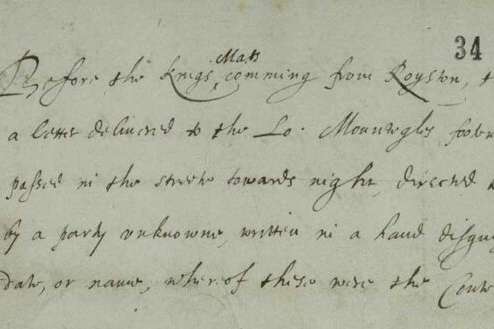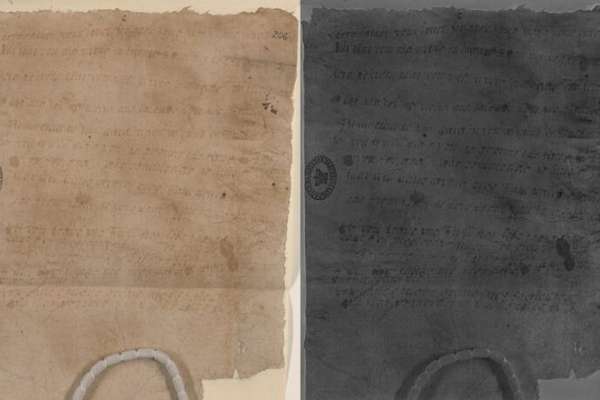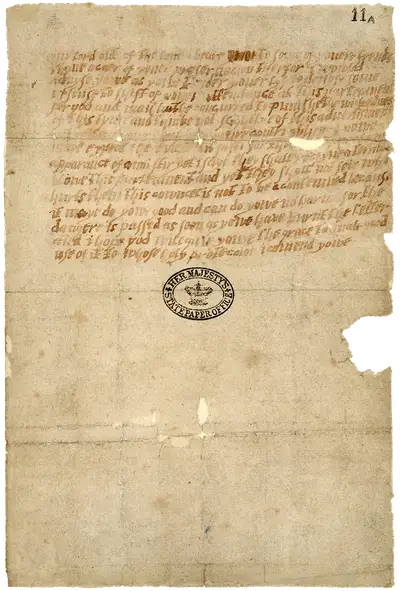Record revealed
The Monteagle Letter
Is this the most famous anonymous letter in British history? Perhaps it should be. Without it, the Gunpowder Plot might have succeeded – and a king and his parliament been destroyed.
Images
Image 1 of 1

My lord, out of the love I beare to some of youere frends, I have a care of youre preservacion, therefore I would aduyse you as you tender your life to devise some excuse to shift youer attendance at this parliament, for God and man hath concurred to punishe the wickedness of this tyme, and thinke not slightly of this advertisement, but retire yourself into your country, where you may expect the event in safety, for though there be no apparance of anni stir, yet I saye they shall receive a terrible blow this parliament and yet they shall not seie who hurts them this cowncel is not to be contemned because it may do yowe good and can do yowe no harme for the dangere is passed as soon as yowe have burnt the letter and i hope God will give yowe the grace to mak good use of it to whose holy proteccion i comend yowe.
My lord, out of the love I bear to some of your friends, I have a care of your preservation, therefore I would advise you, as you tender your life, to devise some excuse to shift off your attendance at this Parliament, for God and Man have concurred to punish the wickedness of this time, and think not slightly of this advertisement but retire yourself into your country where you may expect the event in safety; for though there be no appearance of any stir, yet I say they shall receive a terrible blow this Parliament, and yet they shall not see who hurts them: this counsel is not to be contemned, because it may do you good and can do you no harm, for the danger is passed as soon as you have burnt the letter, and I hope God will give you the grace to make good use of it, to whose Holy Protection I commend you.
Why this record matters
- Date
- 26 October 1605
- Catalogue reference
- SP 14/216
On the night of 4 November 1605, Guy Fawkes was found in the vaults beneath the House of Lords with 36 barrels of gunpowder. Under questioning, he admitted that he and others planned to blow up the House during the State Opening of Parliament on 5 November. The plot would have killed not only King James I (and VI) but members of his family, his chief ministers, and the Members of Parliament in attendance. Treason of the highest order.
We don’t know who wrote it, but according to a contemporary, this note was ‘delivered to Lord Monteagle’s footman as he passed in the street, directed to his Lord by an unknown party, written in a disguised hand without date or name’. It was a tip-off – a plea for Monteagle to stay away from his seat in Parliament that day, to avoid the explosion planned.
However, Lord Monteagle did not take the warning and burn the note as it had asked. He showed it to the Privy Council – the king’s advisors – and King James agreed to try to catch the conspirators in the act. A plot that, unfortunately for Fawkes and his companions, did succeed.
Related galleries
Blogs and podcasts
-
Blog
How the Gunpowder Treason was discovered

This blog looks at a letter in our State Papers from 7 November 1605, detailing the events which resulted in the capture of Guy Fawkes.
-
Podcast
Treason – People, Power and Plot

The history of English monarchs is a tale brimming with assassination attempts. This podcast investigates plots to kill the monarch in the 16th and 19th centuries, and their legacies.
-
Blog
The Gunpowder Plot and heritage science

This blog shares examples of how multispectral imaging can improve the readability of letters written in invisible ink – orange juice – by the Gunpowder Plotters.
